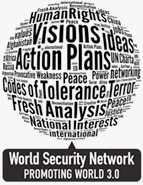Iraqi Kurdistan: Hubertus Hoffmann on the Heaven for Christians and Tolerance Near Hell

When leaving the center of the Iraqi-Kurdish capital of Erbil to head north, one arrives at a suburb called Enkawa (also written Ankawa). Each day, a mirage can be seen there: a large Christian church right on the main street. There are two other churches within this city with its 20,000 Christian residents who comprise the overwhelming majority (97%) - the largest Christian community in the near-hell of Iraq. There is a Christian mayor and a Christian head of the governing Kurdish Democratic Party (KDP), who keep a large cross in their meeting hall and set the tone for city politics. A Catholic/Chaldean auxiliary Bishop is the highest-ranking religious figure. He praises the cooperation between Muslims and Christians as if George Bush had already long reached all of his goals in Iraq and in the Near East.
Iraqi Kurdistan, and Iraq's largest Christian city Enkawa there, are a miracle at the center of the hellish conditions in Iraq. A place of peace; a place of cooperation between the dominant Muslims and the Christian minority in the country. Proof that peace between Christians and Muslims in an Arab region is possible, even in Iraq.
In 628 C.E. Prophet Muhammad granted a Charter of Privileges to the monks of St. Catherine Monastery in Mt. Sinai.
It consisted of several clauses covering all aspects of human rights including such topics as the protection of Christians, freedom of worship and movement, freedom to appoint their own judges and to own and maintain their property, exemption from military service, and the right to protection in war:
“This is a message from Muhammad ibn Abdullah, as a covenant to those who adopt Christianity, near and far, we are with them. Verily I, the servants, the helpers, and my followers defend them, because Christians are my citizens; and by Allah! I hold out against anything that displeases them. No compulsion is to be on them. Neither are their judges to be removed from their jobs nor their monks from their monasteries. No one is to destroy a house of their religion, to damage it, or to carry anything from it to the Muslims’ houses. Should anyone take any of these, he would spoil God’s covenant and disobey His Prophet. Verily, they are my allies and have my secure charter against all that they hate. No one is to force them to travel or to oblige them to fight. The Muslims are to fight for them. If a female Christian is married to a Muslim it is not to take place without her approval. She is not to be prevented from visiting her church to pray. Their churches are to be respected. They are neither to be prevented from repairing them nor the sacredness of their covenants. No one of the nation (Muslims) is to disobey the covenant till the Last Day.”
This charter of privileges has been honored and faithfully adhered to by Muslims throughout the centuries in all lands they have ruled - as well in Iraq for more than 1000 years.
Rofayl Benyman, the auxiliary Bishop of the ancient Chaldean church in Enkawa, speaks of these historical roots and explains why there are still Christians in Iraq and why they have lived together in peace with their Muslims brothers and sisters for over a millennium.
Meeting of Pope BENEDICT XVI with his Beatitud EMMANUEL III DELLY Chaldean Patriarch of Babaylon with Bishops of Chaldean Synods in Rome 12/11/2005
In Iraqi Kurdistan, 50,000 Christians live among 4 million Muslims, comprising just over 1% of the population. According to the Bishop, the basis of their exceptional relationship derives above all from mutual respect for each other, which has been carefully maintained for centuries, as well as the foundation of belief in one God. In addition, the government promotes freedom of religion and the protection of Christian minorities.
The mayor of the Christian city of Enkawa, Fahmi M. Soloka, emphasizes the almost 2000-year-old positive foundation of Christianity, and respect between Muslims and Christians for 1,400 years “as brothers who live together.” The one visits the other on holidays without any fundamental problems. Enkawa is a prime example of peaceful and respectful cooperation between Christians and Muslims. More than 2,000 Christian families have fled Baghdad and Mosul to Enkawa because the situation there is stable and characterized by respect. Another 5,000 Christian families have settled in other areas of Iraqi Kurdistan.
The Interior Minister of the Kurdistan Regional Government, Abdul Karim Sultan Sinjari, refers to the fact that Christians even have their own schools which teach in the Assyrian language: “We love each other and do our best!”
Which conclusions can be drawn from the relationship between Christians and Muslims in Kurdistan?
- Peace between Muslims and Christians in the Arab region is possible and has been practiced for more than a thousand years according to the teachings of the Prophet Mohammed; to respect “the people of the book” i.e., Jews and Christians in their belief; to allow the practice of their religion; and not to force them to turn to the Koran. This peaceful and tolerant teaching of the Prophet has been corrupted, especially by radical Islamists who even use it to justify the murder of Muslims of other faiths, primarily Shiites.
- The war in Iraq is, for the most part, a religiously motivated conflict between Sunnis and Shiites, whereby the minority Sunni population has been oppressed by the Shiite majority for more than a thousand years. Only a thorough policy of reconciliation can mitigate this ancient conflict. Until now, Washington has failed to implement any and all religious and reconciliation strategies. A military strategy is destined to fail because it does not reach to the roots of hatred. Increasingly, Iraq is descending into a culture of revenge.
- The Iraqi constitution, which was approved by more than 80% of the population, points in the right direction, the direction of a plural, federal system in which the rights of minorities are respected.
- Kurdistan is a shining light in the middle of a hellish situation and represents a future-oriented society in a mainly Muslim country in the Arab region—a benchmark not only for the rest of Iraq but also for Syria and Iran.








Comments